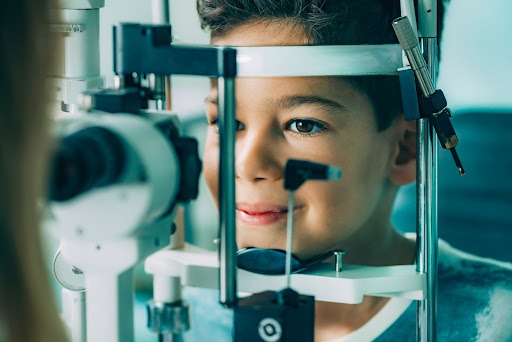Eye Care
10 Simple Eye Care Tips for Children – A Clear Vision

by admin
26th September 2023
5 minutes read
As a parent, ensuring the health of your children is always top of mind, and eye health should be no exception. Eye care is important at every age, but it’s particularly crucial during childhood when good vision is key to learning and development. From recognizing signs of poor vision to teaching good habits, here are 10 simple eye care tips for children to maintain optimal eye health and prevent future problems.
1. Regular Eye Examinations
Just like regular check-ups with a pediatrician, children should also have routine eye examinations. Eye examinations can detect vision problems like myopia (nearsightedness), hypermetropia (farsightedness), or astigmatism early, which can then be treated promptly to prevent further deterioration. Eye doctors also look for conditions like lazy eye or strabismus that can develop during childhood. Regular eye exams should start from as early as six months of age and continue throughout childhood.
2. Balanced Diet
A balanced diet rich in vitamins and minerals is crucial for your child’s overall health and eye health. Vitamins A, C, and E, as well as minerals like copper and zinc, are essential for eye health. Foods like carrots, sweet potatoes, spinach, and oranges are high in beta-carotene and other eye-boosting nutrients. Omega-3 fatty acids found in fish can also help eye health.
3. Limit Screen Time
In today’s digital age, limiting screen time can be a challenge. However, too much time in front of the screen can lead to eye strain, dry eyes, and blurred vision. It’s important to enforce the 20-20-20 rule: after every 20 minutes of screen time, encourage your child to look at something 20 feet away for 20 seconds.
4. Encourage Outdoor Activities
Encouraging your child to play outdoors can benefit their vision. Outdoor activities help children focus at different distances and also expose them to natural sunlight, which is beneficial for developing eyes. Outdoor playtime can also lower the risk of developing myopia.
5. Protect from the Sun
While sunlight is essential, protecting your child’s eyes from harmful ultraviolet rays is just as important. Make sure your child wears sunglasses that block out 99% to 100% of both UVA and UVB radiation. A wide-brimmed hat can also provide some additional protection.
6. Teach Good Hygiene
Teach your child to avoid touching or rubbing their eyes, as this can cause infections or even lead to the progression of conditions like myopia. It’s also important to instill good general hygiene habits, like washing hands regularly, to avoid transferring bacteria or viruses to the eyes.
7. Promote Adequate Sleep
Adequate sleep is essential for eye health. It helps rejuvenate the eyes and prevent eye fatigue, dryness, and blurry vision. Make sure your child gets an age-appropriate amount of sleep every night.
8. Encourage Regular Breaks
Whether your child is reading, writing, or using a digital device, encourage them to take regular breaks to rest their eyes. This will help reduce eye strain and fatigue.
9. Eye Safety
Injury is a leading cause of vision loss in children. Ensure your child’s eyes are protected during potentially hazardous activities. This includes wearing sport-specific protective eyewear during sports and avoiding toys that can cause eye injuries.
10. Watch for Signs of Vision Problems
Be attentive to signs that may indicate your child has a vision problem. This includes squinting, sitting too close to the TV, avoiding activities that require near vision, frequent eye rubbing, and light sensitivity. If you notice any of these signs, schedule an eye examination as soon as possible.
Conclusion
Eye health plays a critical role in your child’s overall health and development. By following these simple eye care tips, you can help your child maintain good eye health and set them on the path to a lifetime of clear vision. Always remember, if you notice anything unusual about your child’s vision or eye behavior, it’s important to consult an eye care professional immediately. After all, when it comes to your child’s eyesight, being proactive is the first step towards prevention.
How Can Medfin Help?
Medfin is a daycare surgery expert providing access to the latest surgical procedures and top doctors in your city at affordable prices. Medfin provides you access to top doctors and surgeons with 10+ years of experience. With Medfin, you can leave your hassles behind and focus on your health. From instant consultations to paperwork assistance, we have got you covered with everything. So why wait? Call us today!
FAQs
1. When should my child have their first eye exam?
You can conduct the first eye exam for your child at 6 months of age, another at age 3, and again before starting school. Regular eye exams are vital to catch any vision problems early.
2. What are signs my child may have vision problems?
Common signs include squinting, frequent eye rubbing, sensitivity to light, difficulty with reading, complaints of blurry vision, headaches, or poor performance in school. Any of these symptoms should prompt an immediate eye exam.
3. Can regular physical activity help in my child’s eye health?
Yes, regular physical activity increases blood circulation, which improves eye health by providing necessary oxygen and nutrients to the eyes. Outdoor activities also expose children to natural light, which is beneficial for developing eyes and can help prevent myopia.
4. What’s the impact of screen time on my child’s eyes?
Excessive screen time can lead to digital eye strain, causing discomfort, dryness, and blurry vision. The 20-20-20 rule (every 20 minutes, look at something 20 feet away for 20 seconds) can help mitigate these effects.
5. Can my child wear contact lenses?
Yes, but it’s often age and responsibility dependent. Many optometrists suggest waiting until the late teens, but some children may be candidates for contact lenses earlier, especially for specific therapeutic reasons.
CATEGORIES
- ACL Reconstruction
- Anal Fissures
- Anal Fistula
- Appendicitis
- ASK A DOCTOR
- Benign Prostatic Hyperplasia
- Breast Lump Excision
- Cataract
- Circumcision
- Conditions & Diseases
- Cosmetology
- Covid-19
- Cure
- Endocrinology
- ENGLISH VIDEOS
- Eye Care
- Gallstones
- General Surgeries
- Government Schemes
- Gynaecology
- Gynecomastia
- Health
- Health Insurance
- Hernia
- hindi
- Hip Arthoscopy
- Hip Replacement
- Hip Replacement Surgery
- Hydrocele
- Kannada
- Kidney Stones
- Knee Arthroscopic
- Laparoscopic
- LASER
- Latest Treatments
- Lifestyle
- Liposuction
- Medfin Stories
- Medicine
- Nephrology
- Ophthalmology
- Orthopaedic
- Paraphimosis
- Patient Testimonials
- PCL Reconstruction
- Phimosis
- Piles (Hemorrhoids)
- Pilonidal Sinus
- Proctology
- Prostate Artery Embolization
- Rhinoplasty
- Second Opinion
- Total Knee Replacement
- Uncategorised
- Urology
- uterine artery embolization
- Uterine Fibroids
- Varicocele
- Varicose Veins
- Vascular
- VIDEOS






